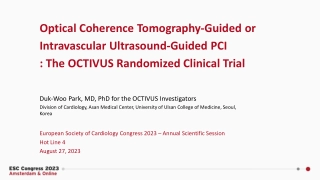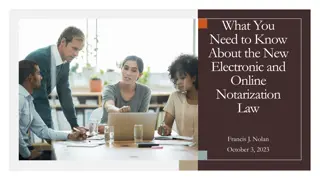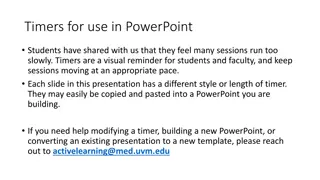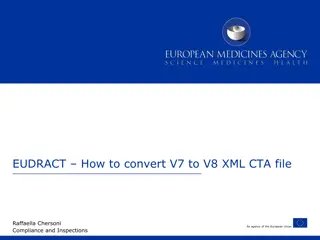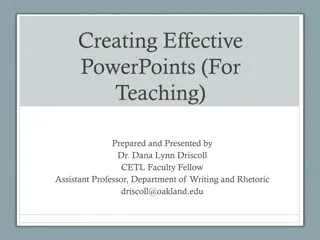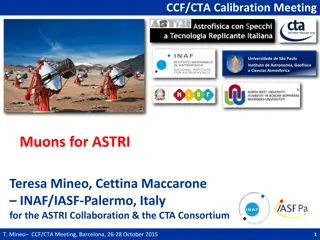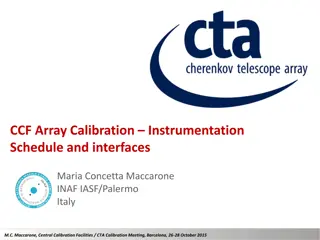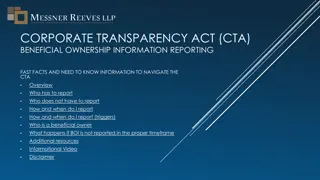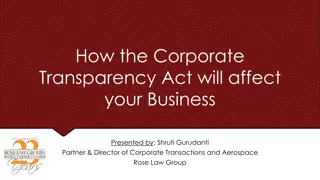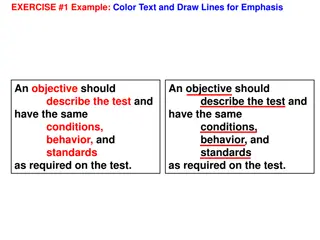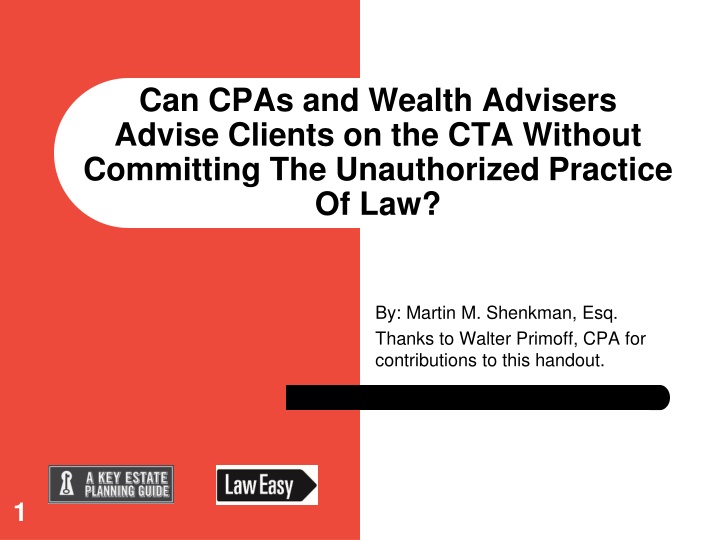
CPAs and Wealth Advisers Guidance on CTA: Avoiding Unauthorized Practice of Law
Discover how CPAs and wealth advisers can navigate advising clients on the CTA without committing the unauthorized practice of law. Explore insights, risks, and considerations to help clients understand their obligations under the CTA effectively.
Download Presentation

Please find below an Image/Link to download the presentation.
The content on the website is provided AS IS for your information and personal use only. It may not be sold, licensed, or shared on other websites without obtaining consent from the author. If you encounter any issues during the download, it is possible that the publisher has removed the file from their server.
You are allowed to download the files provided on this website for personal or commercial use, subject to the condition that they are used lawfully. All files are the property of their respective owners.
The content on the website is provided AS IS for your information and personal use only. It may not be sold, licensed, or shared on other websites without obtaining consent from the author.
E N D
Presentation Transcript
Can CPAs and Wealth Advisers Advise Clients on the CTA Without Committing The Unauthorized Practice Of Law? By: Martin M. Shenkman, Esq. Thanks to Walter Primoff, CPA for contributions to this handout. 1
Some Webinar Pointers All programs hosted by Shenkman Law are free and we focus on providing colleagues with practical and actionable planning ideas. Our goal is to help you, our colleagues, with your practice. The PowerPoint is available for download from the web console during the program. A recording of this program and the materials will be posted to www.shenkmanlaw.com/webinars within about a week of the program. There is a growing library of 150+ webinar recordings there. There is a growing library of 200+ video planning clips on www.laweasy.com. There is no CLE or CPE for this program, but the webinar system will send you a certificate of attendance. We cannot control those certificates, so if there is an issue, we cannot assist. If you have questions, please email the panel. All emails are listed near the end of the slide deck. 2
General Disclaimer The information and/or the materials provided as part of this program are intended and provided solely for informational and educational purposes. None of the information and/or materials provided as part of this PowerPoint or ancillary materials are intended to be, nor should they be construed to be, the basis of any investment, legal, tax, or other professional advice. Under no circumstances should the audio, PowerPoint, or other materials be considered to be, or used as independent legal, tax, investment, or other professional advice. The discussions are general in nature and not person-specific. Laws vary by state and are subject to constant change. Economic developments could dramatically alter the illustrations or recommendations offered in the program or materials. 3
CPAs and Wealth Advisers Guiding Clients on the CTA UPL Issue 4
CPAs and Wealth Advisers Advising Clients on the CTA Contrary to FinCEN belief that BOI Report filers can readily do this themselves, when clients first learn of the CTA, many turn their professional advisors. FinCEN doesn t understand how intimidated our cients many are by the volume of rules and the severity of penalties. Wealth advisers, often the primary or initial advisers people call, may be the first to help clients understand that they have to look into whether the CTA applies to them. Also, as wealth advisers often have the most frequent contact with clients of any advisers, they may be the ones present when questions about the CTA arise. CPAs who file tax returns seem like a natural to call as the data reported for the CTA feels similar to the income tax filings CPAs routinely deal with. What is the risk of the unauthorized practice of law or UPL? 5
What CPAs and Wealth Advisers Want to Think About CPAs and wealth advisers may be reticent or even prohibited from helping advise on the CTA because of their risking UPL, the unauthorized practice of law. CTA and its related FinCEN guidance use many subjective terms that are left undefined, like important decision making . Equally subjective judgments are required to decide what to put in a BOI Report. The CTA because it can be incredibly nuanced, and the rules are not intuitive. The CTA pronouncements (the law, FAQs, Small Business Guide, and more) are probably more than 500 pages of materials and not an easy read. Consider the time any professional will have to invest to become conversant with the CTA (and many more scores of hours to become proficient). Many professional advisers have determined that this investment is just too costly. 6
What CPAs and Wealth Advisers Want to Think About To properly address a client s specific CTA filing questions can be costly in terms of professional time beyond what many clients will want to pay. Where is the value proposition in paying thousands of dollars for advice to fill out a simple online FinCEN form? Considering the complexity of many CTA issues and the harsh potential penalties, now compounded by the UPL risk, advisers need to evaluate the role they are willing to serve. The problem is clients will increasingly reach out to their wealth advisers and CPAs for help. 7
Whose Left to Help? Lawyers? One of the problems is that many lawyers don t want to touch the CTA. Many CPAs have had law firms calling them to ask about the CTA rules. Some, perhaps many, law firms send clients wanting new entities to corporate filing services or online websites to form or self-form entities so the firms can avoid being listed as a Company Applicant anywhere. If the unauthorized practice of law (UPL) issue restricts CPAs and wealth advisers from providing guidance, and if many lawyers are unwilling or unable to be involved, who will be advising clients? Consider that many advisors hire lawyers, or use filing services for their own compliance. 8
What is UPL? Is it Law? 9
What is UPL? Legal services are work efforts that involve legal discretion or decision-making. When legal knowledge, training, skill, and ability are required to perform a task, that is the practice of law. If a non-lawyer provides legal services that can only be performed by a licensed attorney, it is a crime punishable by fines and even jail time. This is serious stuff that non-lawyers need to be mindful of before deciding to help clients with CTA questions. UPL rules aim to protect the general public from someone without appropriate legal training from giving advice that can be harmful. The potential penalties are intended to dissuade non-lawyers from providing advice or services when they should not. Last fall, the CTA s newness, complexity, the fact that it is not tax law (the one legal area where CPAs are broadly permitted to practice,) and the severity of CTA penalties caused the CPA professional liability insurers to jump to the conclusion that other than giving clients general notice about the CTA, providing services in this area was likely to be UPL. Are there some services that may be UPL and others that CPAs can provide? 10
Consider the Purpose of UPL The MD Opinion (see below) provided the following insight: In evaluating whether the non-lawyers actions should constitute UPL, consider the purpose of the unauthorized practice prohibition, which is to protect the public and the legal system from unqualified and/or unethical practitioners. In some situations, there will be little consumer benefit to requiring an attorney to perform a particular task, and little threat that the absence of an attorney will result in the consumer harm that the prohibition against unauthorized practice is designed to prevent. The above concepts would seem to reasonably apply to many CTA reporting functions, certainly the more formalistic ones. 11
Exemptions from UPL If Advice is Legal There Must be an Exemption 12
Practical Exceptions from UPL Restrictions The realities of modern commerce and life have resulted in the laws restricting the practice of law to make exceptions. For example, in some jurisdictions, real estate brokers may be given some latitude in creating an initial contract to sell a home. The issue of non-lawyers handling limited real estate legal contracts is discussed below in the context of evaluating the implications of recent legal actions in Iowa on non-lawyers helping with the CTA. As the world continues to evolve, websites that enable consumers to prepare legal documents, such as wills, have become common. Again, some exceptions to UPL were carved out, again with guardrails. Artificial intelligence will be a new frontier in UPL, and the law will likely struggle to keep up. The services websites can offer in preparing a will, and other documents will grow exponentially. 13
Practical Exceptions from UPL Restrictions for Tax/CPAs CPAs are given the right to prepare tax returns and provide tax advice. These exceptions were made to serve consumers better because the Courts and legal system recognized that some flexibility, with appropriate limitations, benefited the general public. Because of the long tax practice history, Circular 230, and CPA judicial victories in several states where state bars tried to get sophisticated CPA tax practice classified as UPL, many CPAs perform the most complex tax law analysis. A CPA with the above skill set, who invests the time to become proficient with the CTA, should be able to interpret the CTA and advise clients. In some cases, the CTA references various statutes outside of the CTA, where CPAs would lack the competence to advise clients on those matters. But is interpreting complex partnership agreements, employment agreements, trust documents and structures, etc., work that can be done without legal experience? Of is that simply where CPAs might draw the line and involve counsel? But because CTA is not tax law, the valid UPL issue has arisen. 14
Practical Exceptions from UPL Restrictions for Tax/CPAs There are different types of CTA guidance that might be considered in evaluating the application of UPL to CPAs providing CTA advice to clients: 1. The CTA Statute and the FinCEN Regs. These in the UPL if CPAs directly interpret them for clients unless the Courts, like Iowa, rule otherwise. 2. The FinCEN Small Entity Compliance Guide and the FAQs are specifically designed for small business owners to help them self-file. Some might put these into the CPA Compliance rather than the practice of law box. Guiding clients to the appropriate sections of the Guide and pointing out the rules for them might be standard CPA compliance work. 3. In more complex CTA analysis, complex partnership agreements, employment agreements, trust documents and structures, and other legal documents have to be analyzed and interpreted in light of CTA guidance. For example, do the powers given to a particular person/position under one or more of the governing legal documents create substantial control. That seems to be a legal decision and the practice of law. 15
Exemption from UPL for CTA Advice? Questions. Can non-lawyers advise clients on the CTA, and to what extent? Should You? The UPL risks in the context of the CTA should worry many CPAs and wealth advisers to the point where they may be reluctant to give advice or assist in filings. Timing. That will be a disaster for clients struggling to comply with these new rules by year-end. While all these issues will be sorted out over time, the requirement that initial filings for entities formed before 2024 be made by year-end may not provide adequate time for clarity on the CTA and UPL for CPAs and wealth advisers to help. 16
Whose Guidance Matters on UPL? Several Authorities May be Relevant To Your Analysis 17
Whose Opinion Matters on UPL Issues? While FinCEN indicated that accounts and other professional advisers may help consumers, that doesn t offer sufficient comfort to CPAs, wealth advisers, and other non- lawyers to get involved. See FinCEN FAQ B.7, July 9, 2024. The UPL issue remains in the purview of each state s court system. FinCEN s comments might be considered by a state judiciary in evaluating what it might do, but each state s laws on this matter. And that is what CPAs, wealth advisers, and others must consider. Many non-lawyers will consider all the uncertainty above and determine that either they will have no involvement with any CTA matters or that they will limit their participation to general discussions with clients and not give specific advice. Consider the burdens just evaluating all of this puts on a CPA or wealth adviser! And that is in addition to wading through the CTA rules to understand them! 18
Whose Opinion Matters on UPL Issues? The American Institute of Certified Public Accountants ( AICPA ) promulgates standards for various practice areas such: AICPA, Statement on Standards for Consulting Services No. 1 (1991). AICPA, Statement on Standards in Personal Financial Planning Services (2015). With relatively few BOI Reports having been filed to date, a few million out of more than 32 million expected, FinCEN has become increasingly concerned and willing to work with the AICPA. There are active efforts with FinCEN and Congress to get a federal practice exemption from UPL for CPAs to work in this area. The AICPA is also working with Congress to extend the due date of existing Reporting Company BOI Reports beyond Jan 1, 2025. None of this provides cover for wealth advisers. 19
Insurance Carrier Implications Key to Consider on UPL Issues? Another important consideration is that each adviser considering giving advice on the CTA to clients should evaluate their professional malpractice liability insurance coverage. While there has been much discussion in the accounting world about this, the responses have evolved and may again evolve based on the New Jersey and Iowa changes discussed below. So, step one for many advisers may be to review their policies and speak to their insurance carriers. The latter step will be necessary given its dynamic nature. As no state has yet prohibited CPAs from performing CTA services, and some states, New Jersey, Iowa and Maryland have indicated various levels of permission to provide CTA services, the concerns a professional liability insurers have moderated. But it remains important for CPAs to check with their carriers. 20
Insurance Carrier Implications Key to Consider on UPL Issues? Another consideration for non-lawyers is that if their services are characterized as UPL under applicable state law (which itself is uncertain and developing), will that adversely affect the insurance coverage they thought they had? Financial advisors, especially Registered Representatives of broker- dealers have many more regulatory constraints than CPAs regarding services they can provide clients. These are often based on the policies of their broker-dealer or investment advisor firm. Checking with their firms and E&O advisors is critical. 21
New Jersey Supreme Court Committee on the Unauthorized Practice of Law Perhaps the Key Authority...For Now 22
New Jersey Opinion May Be the Key Guidance Right Now The Supreme Court Committee on the Unauthorized Practice of Law issued an opinion to the New Jersey Society of Certified Public Accountants on July 9, 2024, directly addressing the issue of whether providing clients advice on the CTA is UPL. We ll call this the NJ Opinion. The analysis in the NJ Opinion is essential for CPAs and wealth advisers seeking to help clients with the challenges of the CTA to understand and assess the risk of their getting involved. It may also inform non-lawyer advisers on the level of assistance they wish to provide. This may even include the many filing services that have sprung up to charge consumers for help with CTA filings. 23
Step 1: Is Advising on the CTA Is the Practice of Law? At least in NJ 24
NJ Determined That Advising on the CTA is Legal Advice The NJ Opinion concluded that advising on the CTA, a complex law, is legal advice. It then concluded that some limited exceptions should be provided to help consumers. The NJ Opinion stated: The Committee finds that filing beneficial owner information reports is the practice of law, as it entails applying the terms of a dense statute to a set of potentially complicated facts. It is hard to argue that the CTA isn t a dense statute. Further, the CTA is not just a statute but an ongoing stream of FAQs, a Small Business Guide, and other pronouncements from FinCEN. It also seems pretty clear that the guidance FinCEN continues to issue makes compliance more complicated and nuanced. 25
NJ Determined That Advising on the CTA is Legal Advice At least in New Jersey, advising on the CTA is legal advice. Unless the reasonable conclusion that the CTA is a complex law requiring legal analysis to apply is contradicted by other state courts, it seems that this will be the starting point in any UPL analysis. Reasoning. Consider what might be necessary to determine who may exert substantial control over a Reporting Company that may characterize them as a Beneficial Owner who is required to report. For an S Corporation, someone may have to read the by-laws and shareholders agreement and perhaps even consult state corporate law. The powers found for each person under those documents would then have to be evaluated under the guidance provided by FinCEN and the definitions of what constitutes substantial control under the CTA. Is that a task someone without legal training would have the knowledge and expertise to evaluate? 26
Step 2: Is an Exemption From UPL Provided If CTA Guidance is UPL, Does the Law Exempt it? 27
Is an Exemption From UPL Provided? Since advising on CTA is the practice of law, should an exemption from UPL be provided for to help the public? Historical Exemption #1: The NJ Opinion considered whether preparing and filing a New Jersey Inheritance Tax Return is the practice of law and whether a licensed CPA may engage in that activity. It is given the legal nature of the filings. However, because of the unique skills of CPAs and the general public's need for this help, the courts in New Jersey found that as an exception to the rules governing UPL, it was permissible for CPAs to file these returns relating to an estate. In other words, an exception to the UPL rule was provided. Historical Exemption #2: Real estate brokers are given limited exemption on certain residential real estate transactions. 28
Is an Exemption From UPL Provided? This framework is important to understand. If a state court views providing guidance on the CTA as practicing law, which seems reasonable if not likely based on the complexity of the rules and the NJ Opinion, CPAs and wealth advisers would have to rely on an exemption to guide their clients. Unless an exemption exists, and that would seem to have to be on a state- by-state basis, CPAs, wealth advisers, and perhaps even the companies providing filing services would have to be aware that they will be practicing law. 29
Step 3: Exemptions Often Come with Guardrails These are intended to Protect the Public 30
Guardrails For UPL Exemption Another part of the analysis in the NJ Opinion was the discussion of guardrails, as explained above. When the Court in New Jersey permitted CPAs an exemption from UPL to file New Jersey inheritance tax returns, they required a guardrail. The CPA must notify their client that a review of the inheritance tax return by a lawyer would be advisable. The Court stated that this requirement of notification was "essential for the protection of members of the public who might otherwise be willing to rely entirely on the skill of the accountant to protect their interest. Nonlawyers relying on a UPL exemption must be careful to respect any guardrails (requirements) the exemption from UPL imposes. 31
Summary of 3 Steps in UPL Analysis But there is more 32
3-Step UPL Process for CPAs, Wealth Advisers and Others Generalizing from the analysis under the NJ Opinion might suggest the following sequence: First, unless there is a contrary view, providing guidance to clients on their obligations under the CTA is likely the practice of law. This determination may differ from state to state, but there seems to be limited guidance so far and the conclusion in the NJ Opinion seems reasonable, although Iowa may be different as discussed below Second, there would then have to be an exemption provided in your state from applying the UPL rules for a non-lawyer to help clients. You have to be sure that you fit in that exemption. For example, the NJ Opinion provided a limited exemption from UPL for CPAs and enrolled agents, not for wealth advisers. So, if the state you practice in has an exemption for UPL as to the CTA, you must see who it covers and under what circumstances (see below). If they address this UPL issue and the CTA in time for the initial filing, other states may make broader or lesser exemptions (see the discussion of Iowa below). But right now for the CTA timing is a real issue as filings are done by year-end. 33
3-Step UPL Process for CPAs, Wealth Advisers and Others Third, guardrails may also be provided when the exemption is provided. You would have to find out what those are, as they might differ state by state, and be sure you adhere to them. For example, the NJ Opinion is limited when CPAs and enrolled Agents can help (e.g., non-complex filings and required notices). Other states may have no guardrails or different guardrails. Consider wealth advisory, CPA, and other firms that operate in many different states. There is little guidance today, perhaps only in New Jersey and Iowa. The rules may differ, perhaps in both material and subtle ways, from state to state. If you are a CPA firm practicing in five states, you might need a legal analysis of the UPL rules in each of those states. But it might even be more complicated. What if you are a wealth advisory firm practicing in only one state, but you service clients in more than a dozen states who have entities in a score of states? Which state law UPL rules apply to the advice you give? 34
NJ Opinion: Detailed Discussion of Exemption The Devil is in the Details! 35
Details of the NJ Opinions Exemption - 1 The NJ Opinion is detailed and logical in its presentation (whether or not you agree with the conclusions) and may be the only detailed guidance available on this issue. So, digging a bit deeper into what it said might be helpful. Here is the exact language from the NJ Opinion, as it is important to understand: With regard to beneficial owner information reports under the Corporate Transparency Act, the Committee finds that the public needs protection, given the complexity of some matters and the significant civil and criminal penalties for noncompliance with the Act. Complex filings require a lawyer's judgment, training, and expertise - the analysis may be tricky and the risk of penalties, if the analysis is faulty, is greater. While the public needs protection in complex matters, however, most filings will be straightforward. For example, all matters where there is a single owner of a limited liability company will be simple - that single owner is the beneficial owner of the entity for purposes of the Act. In such cases, one does not need to be a lawyer to determine the necessary information to include in a beneficial owner information report. 36
Details of the NJ Opinions Exemption - 2 Corporate entities that have straightforward filings would have a cost savings if they do not need to hire a lawyer to file the report. The remaining factors to consider whether corporate entities are aware of the risks of using a nonlawyer for the services and voluntarily forego a lawyer for this task - are not known since the Act is so new. Given that most filings are likely to be straightforward, the Committee finds that a licensed CPA can engage in this conduct provided the CPA notifies the client that it may be advisable to consult with a lawyer. The Committee relies on the professionalism of CPAs to ensure that such licensees will recognize when a filing is more complex and it is in the client's interests for a lawyer to be retained in the matter. While small businesses are now faced with retaining a lawyer or a CPA (or Enrolled Agent) to submit such reports, the businesses with straightforward filings should be able to do the task themselves, with guidance from FinCEN, the U.S. Chamber of Commerce, and other entities. Corporations may file the forms on their own, but if they hire someone to do it on their behalf, it must be a lawyer or a CPA/Enrolled Agent. 37
Discussion of the NJ Opinions Exemption whether entities are aware of the risks of using a nonlawyer for the services and voluntarily forego a lawyer for this task - are not known since the Act is so new. It may be required, and even if not prudent, for a non-lawyer advising a client on the CTA filings to inform their client that there are legal decisions and using a non-lawyer may raise risks, especially since the CTA is so new. That probably should be done in writing to that the non-lawyer can corroborate that this was done. CPA and wealth advisory firms may want to put this into their engagement letter or some other document their clients sign when accepting CTA advice. This is one of the guardrails the NJ Opinion appears to impose. The NJ Opinion states: where there is a single owner of a limited liability company will be simple - that single owner is the beneficial owner of the entity for purposes of the Act. This statement proves the point of the NJ Opinion that the CTA is not simple. Even in a single-member LLC, complexity abounds if that member is a trust. Even in a single-member LLC, if a key employee has substantial control, that person may be deemed a beneficial owner and may, therefore, have to file. Caution is thus in order for any non-lawyer providing CTA guidance in New Jersey. 1. 2. 38
Discussion of the NJ Opinions Exemption The NJ Opinion states: The Committee relies on the professionalism of CPAs to ensure that such licensees will recognize when a filing is more complex and it is in the client's interests for a lawyer to be retained in the matter. This is a guardrail imposed on non-lawyers, but a difficult one perhaps to delineate. When a CTA filing is more complex the CPA or enrolled agent must inform their client that it is in that client s interest to retain an attorney. It may not be clear whether the CPA must cease assisting the client or inform them that their issue is complex and that legal counsel should be used. However, if the CPA continues to help, and the matter is found to be complex, then the CPA may, in addition to any other claims if an issue arises, potentially face the risk of violating the UPL rules. That might also taint the availability of the CPA's malpractice coverage. 1. 39
Discussion of the NJ Opinions Exemption Some might suggest that the term complex should not apply to helping a client comply with the CTA with information contained in the Small Business Guide & FAQ s , as opposed to directly interpreting the CTA Statute & Regs. as UPL. The Maryland Attorney General s opinion emphasizes that taking clients through the Small Business Guide is not UPL for CPAs. As stated above, the exemption, with guardrails, provided by the NJ Opinion only applies to CPAs and Enrolled Agents, not wealth advisers or others. 1. 2. 3. 40
Maryland Attorney General Weighs In on UPL and CTA A Very Detailed Analsis 41
Background on Maryland Opinion ( MD Opinion ). The Maryland Attorney General s opinion, issued May 8, 2024, on the unauthorized practice of law about the Corporate Transparency Act appears at 109 Op. Att y Gen. 32 (2024). See: marylandattorneygeneral.gov. https://www.marylandattorneygeneral.gov/Opinions%20Documents/20 24/109OAG32.pdf The State Board of Public Accountancy requested an official opinion of the Attorney General analyzing whether and under what circumstances a certified public accountant ( CPA ) who prepares a BOIR for a client or assists a client with BOIR preparation would be engaged in the unauthorized practice of law. In Maryland, the authority to define the practice of law rests with the courts. 42
Providing General Information Should Be OK? A CPA clearly may provide clients with general information about the BOIR requirement that is not particularized to any specific client s situation. Providing general information about the law, without expressing a view about the client s particular circumstances, is not law practice. It thus would not be the practice of law for a CPA to offer clients general information about the BOIR requirement or to answer general questions about it. A CPA could direct a client to BOIR guidance promulgated by FinCEN, such as the FinCEN Compliance Guide and FAQs on the FinCEN website, without straying beyond the boundary of giving general information about the law. CPAs can thus provide this kind of basic information about the BOIR requirement to their clients. While no UPL guidance has addressed wealth advisers, it would seem that if wealth advisers stay within the parameters of only provided general information they may avoid UPL as well. However, that should be confirmed with the firm s general counsel and insurance carriers. But wealth advisers should consider that the MD Opinion stated: CPAs, like lawyers, are subject to high ethical standards. The CPA code of professional conduct, adopted by the Board of Public Accountancy, covers subjects such as independence, truthfulness, competence, and confidentiality. It did not address wealth advisers. 43
What Else Should Be OK? While the MD Opinion doesn t address wealth advisers it would seem providing general information to clients may be helpful and permissible. It is not clear that wealth advisers can go further and assume what is permitted to CPAs is permitted to them. Similarly, if a client were to determine for itself that it is a reportingcompany covered by the Act and provide its CPA with a list of its beneficial owners, the CPA could perform the ministerial tasks of gathering the necessary contact information for those beneficial owners, filling out the BOIR form, and filing it with FinCEN. A CPA may walk a client through the instructions as laid out in FinCEN s Compliance Guideby directing the client s attention to each question in turn and recording the client s answers. A CPA can help a client determine whether it is a reporting company or assist a client with identifying its beneficial owners. CPAs may provide a client with the instructions and guidance FinCEN has published for completing the BOIR form; walk the client through FinCEN s instructions (which are designed for nonlawyers); define terms in the instructions that are within common knowledge for a layperson or CPA; and help the client answer factual questions from the client s records or the CPA s own knowledge. 44
What Might Be OK based on the MD Opinion A CPA practice of assisting with other form-based federal reporting and disclosure requirements may have evolved by analogy to tax practice. CPAs help their clients comply with federal requirements to disclose foreign bank accounts and interests in foreign corporations. A new area where some CPAs are considering offering services is the beneficial ownership disclosure requirement of the Corporate Transparency Act. Is the process involved sufficiently administrative that any advice given would not constitute the unauthorized practice of law. It should not be the practice of law for a CPA to define at least some terms in order to clarify the questions for a client. This would include terms like corporation or stock that would be familiar to a layperson with only the most elementary knowledge of law. A CPA might also define terms, like equity or trust, that would be familiar to CPAs through their own training and expertise, even if not to the general public. Terms that are within the expertise of a reasonably competent CPA do not necessarily require legal knowledge or training to define. 45
Guardrails Some of the individual questions within the instructions might call for some form of legal analysis, such as whether a particular individual has authority to appoint or remove a majority of the entity s board of directors. A CPA who merely asks the client these questions and notes the answers would clearly not be practicing law. However, to ensure that the client does not explicitly or implicitly rely on the CPA for legal advice during this process, we recommend that the CPA warn the client that the CPA cannot provide legal advice and that the client should consult an attorney if uncertain about any legal question. Consider including that in the CTA engagement letter. 46
What Might NOT Be OK, or what is UPL? A CPA who goes beyond the types of activities listed above is at much greater risk of engaging in unauthorized law practice. To the extent a CPA s BOIR assistance requires the knowledge, skills, and training of a lawyer such as application of the general legal principles of statutory or contract interpretation, analysis of legal precedent, or identifying legal issues in a client-provided fact pattern (so-called issue spotting ) that assistance may violate the prohibition on unauthorized practice of law. CPAs should not delve into matters that require the knowledge of substantive legal principles appropriate, the skills of legal research, analyzing precedent, evaluating evidence, legal drafting, determining what kind of legal problems a situation may involve ( issue spotting ), or the judgment to determine the best legal means of pursuing a client s objectives. The following statement in the MD Opinion is helpful: the ultimate question remains whether the particular activity at issue requires a lawyer s knowledge and skills, and thus comes within the fair intendment of the term practice of law. 47
What Might NOT Be OK, or what is UPL? More difficult issues could arise if a client were to ask their CPA to go beyond walking them through the instructions and defining terms. For example, a client might seek advice from their CPA on how to answer a question from the instructions when the client is uncertain how the instructions apply to the client s situation; might ask a CPA to answer one or more of those questions for the client; or might want to delegate the BOIR preparation process in its entirety to the CPA. Whether a CPA can help the client answer a question in the instructions, or actually answer some or all of those questions on the client s behalf, depends on whether answering the question(s) would require legal knowledge and skill. Questions such as whether an individual controls a majority of board seats, or whether a type of interest in the company that is not mentioned in the instructions qualifies as an ownership interest, might in some cases require legal skills to answer, depending on the extent to which analysis and interpretation of legal documents is required. Whether there are any other individuals who have substantial control over your company, or any other instrument, contract, arrangement, understanding, relationship, or mechanism to establish ownership, is the sort of unguided issue spotting in a legal context that lawyers normally perform. 48
FinCEN Guidance The MD Opinion suggests that CPAs using guidance FinCEN published to help lay persons file should be permissible and not UPL. Also, the phrase used above, form-based reporting is also a helpful guideline. To help entities comply with the Act, FinCEN has issued guidance to accompany the BOIR form. FinCEN s Small Entity Compliance Guide offers step-by-step instructions to help an entity determine whether it is a reporting company and, if so, to identify its beneficial owners and complete the BOIR. The instructions are intended to provide comprehensive guidance and communicate information about the reporting requirements in plain language. The instructions distill the various questions an entity faces under the Act into flowcharts and yes-or-no questions with illustrative examples. FinCEN also publishes answers to frequently asked questions and other informal guidance on its website. FinCEN, Beneficial Ownership Information: Small Business Resources, https://www.fincen.gov/boi/small-business-resources (last visited May 2, 2024). If CPAs confine the guidance they give to advice gleaned from these sources and their knowledge of the client/business, that may avoid UPL. 49
Specific CTA Activities that May be OK, Subject to Previous Slides (1) complied with; (2) Answering general client questions about the BOIR requirement without particularizing an answer to the client s individual circumstances; (3) Directing the client to guidance [presumably that intended for business owners and the general public] published by FinCEN; (4) Helping a client determine whether it is a reporting company that must file a BOIR; (5) Helping a client that is a reporting company identify its beneficial owners (and, for new entities, its applicants ); (6) Once beneficial owners have been identified, gathering the required personal information on each beneficial owner; (7) Filling out the BOIR and filing it with FinCEN. Informing clients generally that the BOIR requirement exists and must be 50

